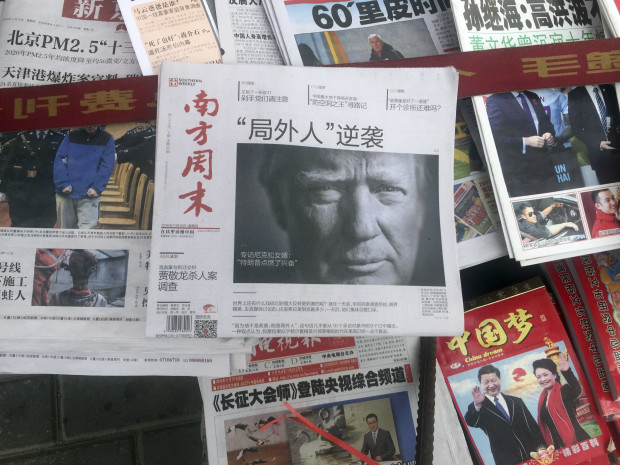China says it will cooperate with Trump, but warns on Taiwan

In this photo taken Thursday, Nov. 10, 2016, a front page of a Chinese newspaper with a photo of U.S. President-elect Donald Trump and the headline “Outsider counter attack” is displayed at a newsstand in Beijing, China. China’s foreign minister on Thursday, Dec. 22, 2016 warned that ties with the U.S. will likely see new complications and that the only way to maintain a stable relationship is by respecting each other’s “core interests.” AP Photo
BEIJING, China—China has warned that ties with the U.S. will likely see new complications and the only way to maintain a stable relationship is by respecting each other’s “core interests.”
Foreign Minister Wang Yi’s remarks Thursday appeared to underscore that China’s position on Taiwan is non-negotiable, weeks after President-elect Donald Trump suggested he could re-evaluate U.S. policy on Taiwan. It also mirrored Beijing’s relatively measured posture toward the incoming U.S. administration despite signs of growing wariness.
READ: China says Trump’s Taiwan comments cause ‘serious concern’
Wang told the Communist Party mouthpiece, the People’s Daily, that China will strive to boost cooperation with the U.S. but he foresaw “new, complicated and uncertain factors affecting bilateral relations” under the Trump administration.
China complained this month after Trump questioned a U.S. policy that since 1979 has recognized Beijing as China’s government and maintains only unofficial relations with Taiwan. Beijing regards the self-governing island as part of China and has long used the “core interest” formulation to signal that any move by Taiwan toward formal independence could be met with military force.
READ: China warns Trump ignoring one-China policy could hurt peace
Trump’s comments on Taiwan, combined with his accusations that China is manipulating its currency and threats of imposing hefty tariffs against Chinese imports, have rattled relations between the world’s two largest economies.
Article continues after this advertisementTrump also accepted a Dec. 2 phone call from Taiwanese President Tsai Ing-wen, the first time an American president or president-elect has publicly spoken to Taiwan’s leader since 1979.
Article continues after this advertisementTsai is planning to transit through the United States next month as part of a visit to Taiwan’s diplomatic allies in Central America, according to Taiwanese media reports Thursday. The reports cite Taiwan’s Deputy Foreign Minister Javier Hou as saying Tsai’s team will try to arrange meetings with U.S. senators or representatives. The reports did not say whether she will meet Trump or anyone from his transition team.
China has in recent days urged the U.S. not to allow Tsai to transit through the U.S. and to “refrain from sending any wrong signal to the Taiwanese independence forces.” U.S. lawmakers often meet with Taiwanese presidents when they transit through the U.S. — most recently in June, when Tsai met in Miami with Republican Sen. Marco Rubio of Florida.
Trump’s transition team announced Wednesday that Peter Navarro, who has accused China of effectively waging economic war against the United States, would head a trade policy council inside the White House.
Asked by reporters about Trump’s appointment of an economist and author whose books include “Death by China,” foreign ministry spokeswoman Hua Chunying said Beijing has been observing the incoming U.S. administration’s transition and its policy direction.
“As two major powers with broad mutual interests, cooperation is the only correct choice,” Hua said without naming Trump or Navarro.
Although Navarro — and Trump — have been heavily criticized in the Chinese press, including state media, Beijing has largely measured its official response to potential flashpoints. This week, China’s military returned a U.S. underwater drone in the South China Sea that Trump had described as “stolen” on Twitter.
In the People’s Daily interview, Wang said U.S.-China relations are generally trending toward stable cooperation and mutual benefit. He quoted a Chinese poem — previously cited by President Xi Jinping as a metaphor for U.S.-China ties — depicting a river that flows inevitably, regardless of mountainous obstacles.
“This is a historical trend that cannot be changed by an individual’s will,” Wang said.
After what he described as a turbulent year steered by the trend of “reverse globalization” and punctuated by terror attacks, Wang said China is now a mature nation that could act as a “stabilizer” in global affairs.
China under Xi is adopting an assertive leadership role on the world stage, Wang said, such as hosting the G20 summit and heading discussions at the APEC forum in Peru.
“The world is choosing between openness and conservatism, cooperation and closure, transformation and old ways,” Wang said. “We will lead the way amid a shake-up in global governance, we will take hold of the situation amid international chaos, we will protect our interests amid intense and complex games.”